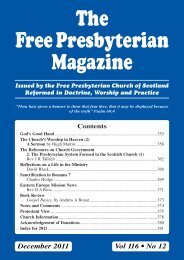March - the Free Presbyterian church of Scotland
March - the Free Presbyterian church of Scotland
March - the Free Presbyterian church of Scotland
You also want an ePaper? Increase the reach of your titles
YUMPU automatically turns print PDFs into web optimized ePapers that Google loves.
84The <strong>Free</strong> <strong>Presbyterian</strong> Magazine<strong>of</strong> John, Viscount Kenmure”, and two biographical works on lesser-knownpersons – Walter Pringle <strong>of</strong> Greenknow and Mrs Janet Hamilton. These allhave <strong>the</strong>ir own spiritual and historical value and interest and will repay carefulreading. A few examples might whet <strong>the</strong> reader’s appetite.In <strong>the</strong> “Soliloquies and Covenant Engagements <strong>of</strong> Mrs Janet Hamilton”we find <strong>the</strong> following testimony, “Praise be to Thee whose care <strong>of</strong> me wassuch, that it was ministers who were valiant for Christ that were sent in myway, such as did not flatter me in my sin, but faithfully and freely did holdout, in <strong>the</strong> gospel, what was sin and duty, and sealed <strong>the</strong> same with <strong>the</strong>irblood” (p 498). Similar pious honesty is found in a letter <strong>of</strong> Elizabeth Melvill:“I confes it is no tyme for me to quarrel nou quhen God is quarrelling us, andhes tane away our deir pastour, who has preached <strong>the</strong> Word <strong>of</strong> God amongus almost fourty years, plainly and powerfully” (p 358). The dying words <strong>of</strong>John, Viscount Kenmure are worth repeating too: “I will not let go <strong>the</strong> gripthat I have gotten <strong>of</strong> Christ: though He should slay me, I will trust in Him,and lie at His feet, and die <strong>the</strong>re; and lie at His door like a beggar waitingon; and if I may not knock, I shall scrape” (p 408). Many such godly confessionsand spiritual exercises can be found in <strong>the</strong> pages <strong>of</strong> this volume. Itshould be noted that extended portions in both volumes are in <strong>the</strong> originalScots dialect, which enhances <strong>the</strong>ir au<strong>the</strong>nticity while not presenting any realdifficulty for readers.The second volume is equally pr<strong>of</strong>itable and useful. It too contains aninteresting blend <strong>of</strong> better-known and less-well-known persons from <strong>the</strong>Covenanting period. Most <strong>of</strong> <strong>the</strong> volume (pp 89-370),is taken up with <strong>the</strong>personal memoirs <strong>of</strong> James Fraser <strong>of</strong> Brea (1639-1698). He was minister atCulross and spent long years as a field preacher and also endured imprisonmenton <strong>the</strong> infamous Bass Rock. Such autobiographies as his are <strong>of</strong>ten dismissedtoday as overly subjective and even harmfully introspective. Thosewho are seeking closer communion with God and are yet conscious <strong>of</strong> <strong>the</strong>plague <strong>of</strong> sin and <strong>the</strong> constant need <strong>of</strong> self-examination and mortification willnot agree with that caricature. The godliness <strong>of</strong> James Fraser is undisputed,and <strong>the</strong> many sources <strong>of</strong> comfort as well as humiliation which he detailsmake this work <strong>of</strong> lasting use in <strong>the</strong> Church <strong>of</strong> Christ. This is not to overlook<strong>the</strong> fact that Fraser <strong>of</strong> Brea’s writings have been justly criticised for a <strong>the</strong>ory<strong>of</strong> universal atonement. 2 It should be remembered that Fraser never publishedhis views. Worthies like Thomas Boston held Fraser <strong>of</strong> Brea in high regardand Boston speaks affectionately <strong>of</strong> him in his memoir.Many examples could be given <strong>of</strong> <strong>the</strong> high spiritual exercises <strong>of</strong> JamesFraser; one or two may suffice. “I am learning to read love in <strong>the</strong> greatest <strong>of</strong>2 See John Macleod, Scottish Theology, pp 173-7, for analysis <strong>of</strong> James Fraser.
















